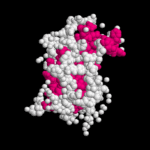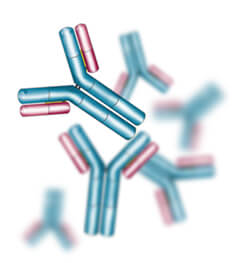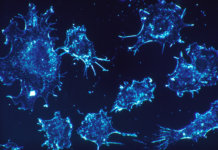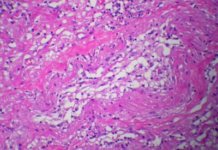Growth hormone as an anti-aging treatment for women?
Growth hormone (hGH) is a molecule synthesized by the body, essential for human growth and development. hGH specifically boosts the secretion by the liver of IGF (Insulin-like Growth Factor), necessary for cartilage growth and cell proliferation[1]. Alterations in growth hormone or its signalling pathway lead to multiple pathologies[2]. Nevertheless, decreased dialogue between hGH and the IGF-1 receptor (also known as IGF-1R for Insulin-like Growth Hormone 1 Receptor) in later life, particularly in females, appears to be associated with increased longevity. Indeed, it has been shown that the decrease in the cellular signal passing through these two proteins improves the longevity of many organisms[3] and that a mutation of the receptor at the IGF in female mice lengthens their lifespan[4].

These observations on animal models have raised questions among scientists about the effect of hGH/IGF-1R signalling on human longevity. The discovery of mutations in the IGF-1R gene in individuals with exceptional longevity[5], and the extension of the healthy life span of nonagenarians carrying mutations in the IGF-1R gene[3], correlate with the results of experiments on animal models. In these two studies, the reduction in signalling on this route affects and benefits only women. In view of the positive effects of this phenomenon on longevity, new therapeutic strategies are currently being studied. This is the case of monoclonal antibodies directed against IGF-1R that prevent the binding of growth hormone to its receptor, thereby disrupting the signal.
Targeting growth hormone (hGH) : pioneer study

It is this therapeutic model that an American team of researchers recently studied. For their study[6] published in Nature Communication, scientists chronically administered a monoclonal antibody directed against IGF-1R in female and male mice, delaying the aging of female mice. The antibody used was specially designed for the murine model and is selective for IGF-1R. The analyses showed good results and a good tolerance to the treatment, even when the treatment was administered after the age of 18 months (elderly mice)[6]. In correlation with previous studies, the treatment showed better benefits in females since it increased their life span by 9%. Preventing signaling of this pathway has also improved cardiac function, and decreased tumours and inflammation in female mice[6]. Again, decreased hGH pathway signalling was associated with longevity in female mammals, but the main finding of the study was that monoclonal antibodies to IGF-1R delayed aging with chronic treatment and in elderly mice[6].There is growing evidence of the value of targeting the hGH pathway at an advanced age for its positive impact on longevity. The results observed in mice suggest, first, that the effects can be reached at an advanced age and, second, that monoclonal antibodies directed against IGF-1R could become a therapeutic means of delaying aging. These results also stand out because they show a unique case where modulation of cell function for healthy lifetime and longevity benefits only females. This observation reminds us of the importance of considering gender differences in anti-aging research to develop more effective treatments.
References :
[1] Andrew J. Brooks and Michael J. Waters. The growth hormone receptor: mechanism of activation and clinical implications, nature reviews, endocrinology volume 6, september 2010, 515-525.
[2] https://en.wikipedia.org/wiki/Growth_hormone
[3] Sofiya Milman, Gil Atzmon, Derek M. Huffman, Junxiang Wan, Jill P. Crandall, Pinchas Cohen and Nir Barzilai. Low insulin-like growth factor-1 level predicts survival in humans with exceptional longevity, Aging Cell (2014) 13, pp769–771 Doi:10.1111/acel.12213
[4] Martin Holzenberger, Joëlle Dupont, Bertrand Ducos, Patricia Leneuve, Alain Géloën, Patrick C. Even, Pascale Cervera & Yves Le Bouc. IGF-1 receptor regulates lifespan and resistance to oxidative stress in mice, NATURE | VOL 421 | 9 JANUARY 2003
[5] Suh et al. Functionally significant insulin-like growth factor I receptor mutations in centenarians, PNAS March 4, 2008 vol. 105 no. 9, 3438–3442.
[6] Kai Mao, Gabriela Farias Quipildor, Tahmineh Tabrizian, Ardijana Novaj, Fangxia Guan, Ryan O. Walters, Fabien Delahaye, Gene B. Hubbard, Yuji Ikeno, Keisuke Ejima, Peng Li, David B. Allison, Hossein Salimi-Moosavi, Pedro J. Beltran, Pinchas Cohen, Nir Barzilai & Derek M. Huffman. Late-life targeting of the IGF-1 receptor improves healthspan and lifespan in female mice, NATURE COMMUNICATIONS | (2018) 9:2394 | DOI: 10.1038/s41467-018-04805-5.
Anne Fischer

Author
Auteur
Anne is studying medicine science at the Institute of Pharmaceutical and Biological Science in Lyon and she has graduated with a Bachelor’s degree in molecular and cellular biology at the University of Strasbourg.
More about the Long Long Life team
Anne étudie les sciences du médicament à l’Institut des Sciences Pharmaceutiques et Biologiques de Lyon. Elle est titulaire d’une licence en biologie moléculaire et cellulaire de l’Université de Strasbourg.
En savoir plus sur l’équipe de Long Long Life














